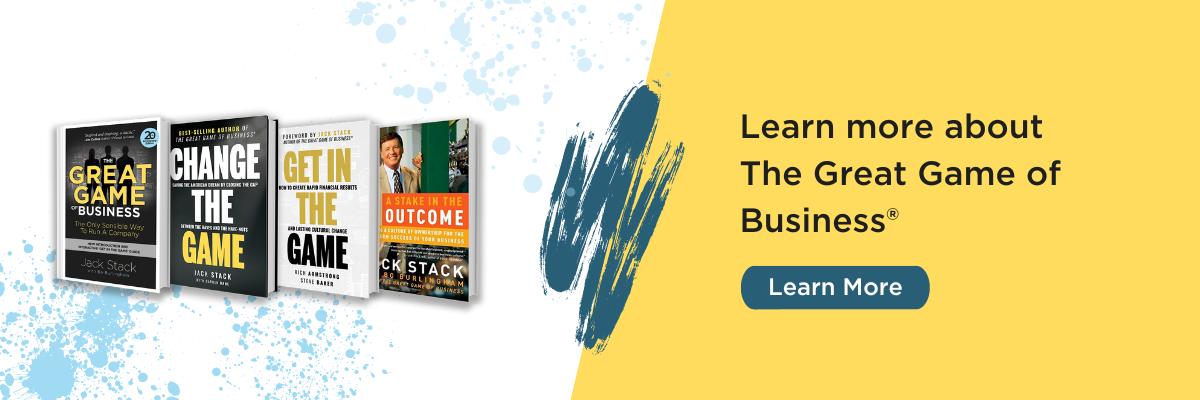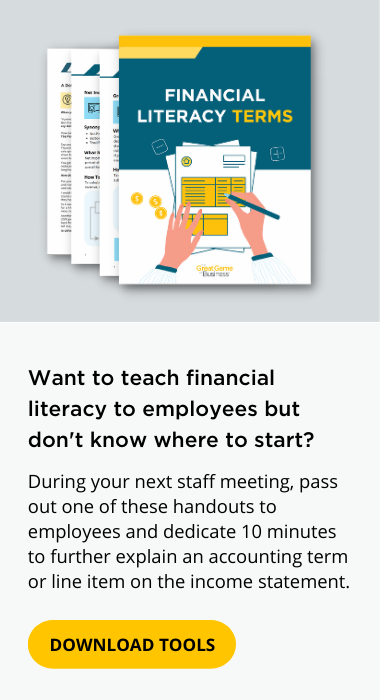
“Maybe that meeting was my missed opportunity,” Ron told me, beating himself up a bit. “The fact that the president hadn’t even reported the actual results from the quarter should have alarmed every one of us board members into taking action.”
That never would have happened at SRC. We work with our financials in real-time and through our constant huddling, not to mention our bi-annual High-Involvement Planning (HIP) meetings where all of our divisions get together to compare our progress on achieving our plans and forecasts. Paranoia can be good for you—unless you don’t do something about what scares you. You can’t hide from the solution and be successful.
The more you teach people about financials, the smarter and more conservative they get with the company’s money because they begin to think of it as their money.
Our forecasts are also much more than projections. Just giving someone a quote on an order wouldn’t count toward a forecast at SRC. Our people would throw rotten eggs at people who rely only on their gut. We need a purchase order or a supply agreement—an actual commitment—before we believe it. We know we can’t rely on fluff and speculation, especially when we have to share those forecasts with hundreds of our fellow employee-owners in one of our HIP sessions—and explain how we came up with them in the first place. We have to substantiate our sales. The more checks and balances you have, the more accurate your forecasts become. Contingency planning is also the art of minimizing risk while understanding that risk is also unavoidable. If you want to succeed in business, you need to be willing to deal with the unexpected and be prepared for it.
We see these HIP meetings as our opportunities to teach employees financials and that the goals the company needs to meet are set by the market, not just dreamed up by management. And it’s magical to see that light bulb go off when someone begins to understand why those goals exist, and how they, personally, can affect them. People begin to understand why certain decisions get made, how the company makes or loses money, and what the company does with its earnings. The mistake most people make is that they focus only on the profit, not where the profit goes or where it’s most needed. Don’t milk the cow until it runs out of milk. Sometimes you need to go back and feed the cow.
When you involve your people in planning for the future, they can also help develop the kind of diversified product and service that can serve as your contingency plans and trap doors you can fall back on if the markets or projections turn against you. We want to build the kind of joint accountability and alignment that ensures everyone is pulling together toward our shared goals. All of our people vote on our plan, which means that our company can’t be run by one leader relying on personal gut decisions. All our leaders are held in check by transparency and accountability.
We’ve also learned that the more you teach people about financials, the smarter and more conservative they get with the company’s money because they begin to think of it as their money. The paradox here is that so many business owners complain that employees don’t think as they do. “Why can’t my people think more like owners when it comes to spending money?” they might say. But what they miss is the chance to tap into the wisdom of the crowd. The lynchpin of the Great Game™ system is having the eyes and brains of our associates involved with every aspect of running the business. We want to appeal to the highest level of thinking in our people.
But Ron’s company was not transparent with its financials. It wasn’t open at all. There was a veil of secrecy keeping people in the company from the facts that would help determine whether their organization was winning or losing. The president held the keys to all of the information.
“He knew how to read financials,” Ron told me. “But he decided not to believe them. He was only willing to share the numbers he wished were true. If they had actually been reporting from the bottom up, they might have known what was going to happen to them much sooner.”
This excerpt from Change the Game: Saving the American Dream by Closing the Gap Between the Haves and the Have-Nots. can be found in Chapter 3, Page 67.
.png)







.png)




-5.png)

